|
|
|
Sort Order |
|
|
|
Items / Page
|
|
|
|
|
|
|
| Srl | Item |
| 1 |
ID:
053040
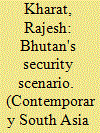

|
|
|
| 2 |
ID:
115271
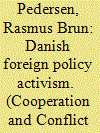

|
|
|
|
|
| Publication |
2012.
|
| Summary/Abstract |
Danish foreign policy is under transformation. Different versions of activism have gradually replaced adaptation and lately Denmark has participated more actively and independently in world politics than ever before. The core in activism is based on a liberal value system that seems to have replaced the adaptation logics dominating Danish foreign policy during the Cold War. Activism has evolved from a multilateral inspired activism in the 1990s to a more Atlantic centred activism during the 2000s. While analysts see the different phases as opposites, my argument is that the types of activism should be seen as a difference of degree rather than a difference of kind. 'Activism' as a foreign policy strategy, however, should be considered analytically as a difference in kind from the adaptation strategies that dominated Danish foreign policy during the Cold War. The main driving force behind this transformation can be found domestically in the Liberal Party's dominant position in Danish politics.
|
|
|
|
|
|
|
|
|
|
|
|
|
|
|
|
| 3 |
ID:
085900
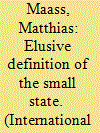

|
|
|
|
|
| Publication |
2009.
|
| Summary/Abstract |
The small state has so far escaped a consensus definition because 'the' small state has in fact been conceived of very differently. Different studies of 'the' small state have characterized it quite distinctly. In fact, there is substantial disagreement even over what type of criteria, quantifiable or qualitative, are most appropriate to characterize the small state. However, I argue that such fundamental disagreement over what makes a state small has actually benefited the area of small states studies by providing it with conceptual flexibility to match different research designs as well as the quite substantial variations among actual small states in the world. In short, in the discipline of international relations as well as in reality, more than one definition of the small state does and should exist.
|
|
|
|
|
|
|
|
|
|
|
|
|
|
|
|
| 4 |
ID:
186535
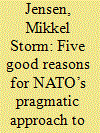

|
|
|
|
|
| Summary/Abstract |
For decades, few NATO members, predominantly the US, had the capabilities to conduct offensive cyberspace operations (OCO). Today more than half of NATO’s members have, or are acquiring, offensive cyberspace operations capabilities (OCOC). Historically, NATO’s planning and coordination is based on shared knowledge of the members’ military capabilities, to a degree even their nuclear capabilities. In the cyber domain, the principle has evolved to include allies’ emerging defensive cyber capabilities. NATO’s approach to OCOC, however, deviates radically: NATO’s doctrine merely integrates OCO’s effects, that is, allow members to contribute with OCOs in operations without sharing information with allies on what OCOCs are available or how the OCOs deliver the effects. OCOC’s technical and tactical characteristics incentivize NATO’s members to keep OCOCs secret, also from allies. This results in a dilemma: Either the allies providing OCOC’s effects risk sharing sensitive information on the means, or the allies, who depend on the provided effects, act without sufficient knowledge of the deployed OCOCs to assess their efficacy, legality, or impact on own offensive or defensive cyber operations. NATO’s limited approach to OCOC is a pragmatic mitigation of the dilemma that allows NATO to train and develop doctrine in the field further.
|
|
|
|
|
|
|
|
|
|
|
|
|
|
|
|
| 5 |
ID:
056544
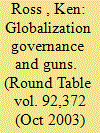

|
|
|
| 6 |
ID:
172976
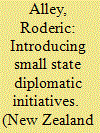

|
|
|
|
|
| Summary/Abstract |
Roderic Alley suggests that most states must maximise opportunities available within a properly functioning, rules-based multilateral order.
|
|
|
|
|
|
|
|
|
|
|
|
|
|
|
|
| 7 |
ID:
131375
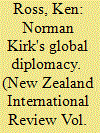

|
|
|
| 8 |
ID:
098881
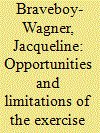

|
|
|
|
|
| Publication |
2010.
|
| Summary/Abstract |
The idea that a microstate such as Trinidad and Tobago can possess and use 'power,' a trait generally associated with a high level of military and economic capability, would appear to a traditional realist to be absurd. This is largely because power is still seen as exercised at the global systemic level or at regional levels that are globally significant. However, small states generally focus their foreign policies on smaller circles, primarily neighbours and dominant bilateral partners. By moving the power analysis (back) to the state (foreign policy) level, extending the definition of 'power' to include status ('position') and actual attempts to get others to adopt an influencer's preferences, and employing the newer views of power as soft and smart, this article argues that even very small states can exercise power within limited domains as long as they possess certain capabilities (in this case, energy resources) and are ready to seize available opportunities. The evidence shows, however, that the results of these attempts are still mixed, limited primarily by perceptual constraints on the part of both the small-state influencer and the target influencee.
|
|
|
|
|
|
|
|
|
|
|
|
|
|
|
|
| 9 |
ID:
191741
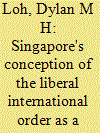

|
|
|
|
|
| Summary/Abstract |
The liberal international order (LIO) is undergoing significant challenges, and this has given rise to debates about its purported decline. In this context, most studies of the LIO focus on major powers with little attention paid to small states’ conceptualizations of the LIO despite its ubiquity in international life. Focusing on the Singaporean case as a small state, it asks the question: how does Singapore conceptualize the LIO and what are the effects of this conceptualization? Through a mixed-method thematic analysis of 192 parliamentary replies, media interviews and United Nations speeches by Singaporean officials between 2000 to 2022, I find Singapore accepting and defending the existing international order in two main ways: demonstrating respect for international law and the UN Charter, and supporting economic liberalism. Meanwhile, Singapore is contesting the universality of liberal democracy as it sees such discourse as a rebuke to its single-party dominant governance model. This perception of the LIO, in turn, informs Singapore's order-maintaining, order-modifying and order-contesting practices: it seeks to not only protect, but also to modify the LIO—through institutional and legal initiatives—to make it more equitable and open, giving us a glimpse into an instance of a small state's agency in relation to the LIO.
|
|
|
|
|
|
|
|
|
|
|
|
|
|
|
|
| 10 |
ID:
153879
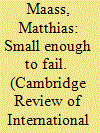

|
|
|
|
|
| Summary/Abstract |
Since the Peace of Westphalia, few great powers have “died”, while the “death rate” and proliferation of small states has been dramatic at times. What causes these fluctuations? In this paper, I claim that the dominant reason for the extinction, emergence and proliferation of the small state over the last three and a half centuries is to be found at the system level. Ultimately, small state survival is determined by the particular set-up of the state system. I advance this argument from the perspective of international relations theory, integrating the relevant scholarship of the English School and realism, especially structural realism. The latter’s systemic perspective provides the basis for arguing that small states are structurally irrelevant. It is this feature of the small state, its irrelevance with regard to the power-based structure of the state system, which has caused the small state to “struggle for existence” in the past, and which has allowed small states to proliferate during the bipolar Cold War.
|
|
|
|
|
|
|
|
|
|
|
|
|
|
|
|
| 11 |
ID:
100321
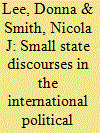

|
|
|
|
|
| Publication |
2010.
|
| Summary/Abstract |
This article supports growing calls to 'take small states seriously' in the international political economy but questions prevailing interpretations that 'smallness' entails inherent qualities that create unique constraints on, and opportunities for, small states. Instead, we argue that discourses surrounding the 'inherent vulnerability' of small states, especially developing and less-developed states, may produce the very outcomes that are attributed to state size itself. By presenting small states as a problem to be solved, vulnerability discourses divert attention away from the existence of unequal power structures that, far from being the natural result of smallness, are in fact contingent and politically contested. The article then explores these themes empirically through discussion of small developing and less-developed states in the Commonwealth and the World Trade Organization (WTO), considering in particular how smallness has variously been articulated in terms of what small states either cannot or will not do.
|
|
|
|
|
|
|
|
|
|
|
|
|
|
|
|
| 12 |
ID:
140835
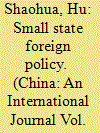

|
|
|
|
|
| Summary/Abstract |
Despite the post-World War II emergence of many small states and growing economic interdependence, small state foreign policy still gets short shrift in international studies. This article seeks to enhance our understanding of the subject by examining the diplomatic recognition of Taiwan. At the time of writing, 23 countries in the world have picked Taiwan over China. This is puzzling at first sight, since China is much more powerful than Taiwan, and a vast majority of countries pick China over Taiwan. This article shows that a full understanding must simultaneously take into account the systemic, domestic and individual levels of analysis. This research lends itself to structural realism, which stresses the role of structural factors in foreign policies, especially among small states. On the domestic level of analysis, this study identifies three important factors: ideology, economy and geography. For structural and cultural reasons, major leaders of Taiwan’s diplomatic allies are found to have loomed large in the diplomatic recognition of Taiwan.
|
|
|
|
|
|
|
|
|
|
|
|
|
|
|
|
| 13 |
ID:
098880
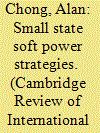

|
|
|
|
|
| Publication |
2010.
|
| Summary/Abstract |
The concept of soft power, or symbolic power, offers unexplored potential for analysing small state power. This article argues that it is a means of virtual enlargement of small states' foreign policy reach and presence. If one examines the bases of soft power, it becomes evident that small states can utilize their political economy potential, models of good governance and diplomatic mediation as forms of power that defy their territorial limitations. Case studies of the Vatican City State and Singapore illustrate 'small state soft power'.
|
|
|
|
|
|
|
|
|
|
|
|
|
|
|
|
| 14 |
ID:
147585
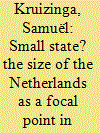

|
|
|
|
|
| Summary/Abstract |
Do small states behave in an appreciably different fashion than their larger counterparts? Social scientists and historians have, for decades, searched for the defining features that set small states apart from larger ones and have come up empty. This analysis suggests that rather than searching for another set of membership criteria, focus should be on the explanatory power of the discourses surrounding the size of states. As this article demonstrates, based on a reading of Dutch international history from the late nineteenth century to the advent of the Second World War, the changing shape of discourses surrounding the “smallness” did historically influence foreign policy practices.
|
|
|
|
|
|
|
|
|
|
|
|
|
|
|
|
| 15 |
ID:
173941
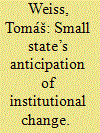

|
|
|
|
|
| Summary/Abstract |
Brexit will profoundly change politics in the European Union, and all countries will have to adjust to the new situation. But the issue is more pressing for small member states that are more dependent on international organisations than big states. This article studies how the institutional setting affects a small state’s preparations for Brexit in the areas of the common security and defence policy and internal market. Contrary to the expectations, it shows that the Czech Republic, the small state under scrutiny, has invested more effort into a preventive adjustment in the internal market policy than to the CSDP. This result is explained by the existence of alternative institutional frameworks that are expected to mitigate the impact of Brexit on EU’s security and defence policy. It also suggests that while small states profit from the existence of strong institutions, they also face the risk of unmitigated impact when these institutions change.
|
|
|
|
|
|
|
|
|
|
|
|
|
|
|
|
| 16 |
ID:
193229
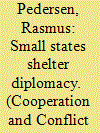

|
|
|
|
|
| Summary/Abstract |
Shelter theory has emerged as a promising but unrealized alternative to existing theories of bandwagon and hiding in the literature. It describes how small states can utilize the structural power of great powers to achieve political aims through the formation of asymmetric alliances. At present it is not clear exactly what shelter diplomacy aims to achieve, what type of costs it protects small states against and to what degree asymmetric shelters are useful when the preferences between the small state and the shelter partner widen. The article addresses these gaps. It develops a realist inspired model of shelter diplomacy that specifies when, how and with what effects small states can utilize the structural powers of great powers. It demonstrates how shelter diplomacy can help small states balance the costs of abandonment and entrapment in the alliance dilemma through construction of both asymmetric and symmetric shelters. The main contributions are to bring shelter diplomacy into the International Relations mainstream literature and develop a new theoretical middle position between the more well-described bandwagon and hiding strategies. The model is applied to a Danish case that demonstrates how small states have utilized and adopted dynamic shelter strategies in the European integration process.
|
|
|
|
|
|
|
|
|
|
|
|
|
|
|
|
| 17 |
ID:
165102
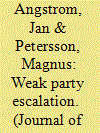

|
|
|
|
|
| Summary/Abstract |
In this article, we develop the strategic rationale behind weak party escalation against stronger adversaries. There are, we suggest, four main strategies: to provoke a desired over-reaction from the stronger adversary; to compartmentalize conflict within a domain in which the weak party has advantages; to carve a niche with a stronger ally, and to forge a reputation of not yielding lightly. Spelling out these different logics contributes to the literature on small state strategies and escalation. It also suggests, contrary to much of the existing literature, that it can be rational for weak parties to escalate against great powers.
|
|
|
|
|
|
|
|
|
|
|
|
|
|
|
|
|
|
|
|
|